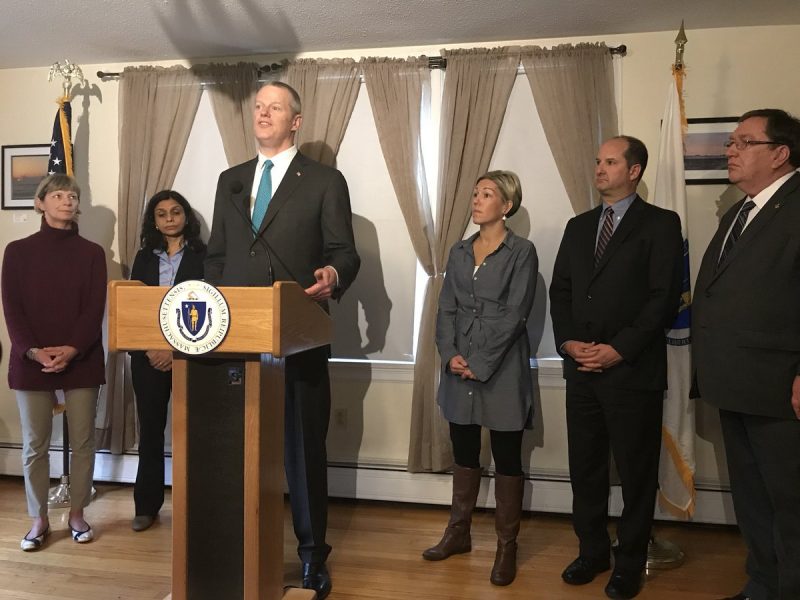Causes
Governor Baker announces $333,000 in substance use funding, asking for more

BOSTON — Governor Charlie Baker today joined members from the addiction treatment and recovery community at the Gavin Foundation’s Devine Recovery Center to call on the Legislature to take up the administration’s second significant package to fight the opioid and heroin epidemic, known as the CARE Act. The Governor also announced $333,000 in newly available federal funding to support programs that help individuals with substance use disorder who are involved in the criminal justice system, and increase the number of people trained to use the life-saving overdose reversal drug, naloxone.
“Our Administration is committed to aggressively combatting the opioid epidemic and proposed these reforms to take even stronger, more targeted approaches to expand treatment and intervene earlier in substance use disorder situations,” said Governor Baker. “With the help of programs like Access to Recovery, we have been able to make significant progress combatting the epidemic but understand significant work remains, particularly as fentanyl plays a larger role in overdose deaths. Opioid deaths were down more than 8% in 2017 and new opioid prescriptions were down 30%, but, we still have a lot of work to do, especially as the presence of fentanyl in overdose deaths continues to rise. We urge the Legislature to pass the CARE Act so we can continue to effectively address one of the greatest public health crises of our time.”
“Recovery coach programs like the one run by the Gavin Center are major tools in the fight against the opioid epidemic and have proven to significantly help guide an individual’s path to treatment and recovery,” said Lieutenant Governor Polito.“Passing the CARE Act will allow the Commonwealth to continue investing in programs that work and resources that can lead to long-term recovery patients.”
The CARE Act, which is currently under consideration by the Legislature, calls for increasing access to treatment and recovery services; addressing gaps in care by ensuring three clear pathways to treatment through emergency rooms; and strengthening education and prevention efforts.
“Crises of addiction occur 24 hours a day, 7 days a week and the CARE Act will open an additional pathway to treatment for those who need immediate help,” said Massachusetts Secretary of Health and Human Services, Marylou Sudders. “It is essential that we continue to invest in successful prevention, treatment and recovery programs throughout the state.”
While opioid-related overdose deaths in Massachusetts declined by 8% percent in 2017 compared to 2016, and opioid prescriptions have decreased by 30 percent since 2015 according to the state’s latest quarterly report, the rate of fentanyl present in opioid-related deaths continues to trend upward, reaching 83 percent in 2017.
“While we have made some progress, there is still much work to be done,” said DPH Commissioner Monica Bharel, MD, MPH. “We must continue to invest in evidence-based prevention and intervention strategies and this additional funding helps support our comprehensive public health approach to the opioid epidemic.”
Massachusetts was one of three states selected to receive $333,000 in funding from the Substance Abuse and Mental Health Services Administration (SAMHSA) to support programs that help individuals with substance use disorder who are involved in the criminal justice system, and increase the number of people trained to use the life-saving overdose reversal drug, naloxone. The funding is overseen by the Department of Public Health (DPH) and supplements a $12 million Opioid State Targeted Response (STR) grant originally awarded to DPH by SAMHSA in April 2017.
The funding will expand the Commonwealth’s prevention and treatment efforts through:
Continued support of the Access to Recovery (ATR) program. ATR provides recovery support services for individuals in early recovery who are in need of assistance with re-entry into the community. Over a six month period, ATR provides support with basic needs, such as transportation, as well as access to job training and recovery coaching. ATR, which is implemented by the Gavin Foundation and other providers, began in Massachusetts in 2010 in partnership with DPH through funding from SAMHSA. Since inception, ATR has helped nearly 18,000 individuals with substance use disorder. According to the Gavin Foundation, participants in the program have seen a 188% improvement in employment and a 152% increase in stable housing.
Overdose education and Naloxone training programs to individuals employed by DPH’s sister state agencies including the Department of Children and Families, the Department of Transitional Assistance and the Massachusetts Commission on Deaf and Hard of Hearing. Training will cover the fundamentals of substance use disorder and addiction, overdose education and referrals to treatment.
“I am pleased with the Baker-Polito Administration’s efforts in combatting the opioid epidemic,” said John P. McGahan, President/CEO of the Gavin Foundation, Inc. “We look forward to working with the Administration on increasing access to programs like Recovery Coaches and ATR in conjunction with traditional approaches to treatment.”
“While the latest data shows the number of overdoses resulting in deaths decreasing,” said Vic DiGravio, president of the Association for Behavioral Healthcare, a trade group for addiction treatment providers. “We don’t see the demand for treatment diminishing therefore we urge the Legislature to quickly pass the CARE Act.”
Other behavioral health leaders joining the Governor today include Kurt Isaacson, CEO, Spectrum Health Care; Emily Stewart, Executive Director, Casa Esperanza; Daurice Cox, President and CEO, Bay State Community Services; Katie O’Leary Recovery Coach Supervisor, North Shore Mental Health Association; and Jackie Moore, President and CEO, North Suffolk Mental Health Association. For more information on the Commonwealth’s response to the opioid epidemic as well as links to the latest data, visit www.mass.gov/opioidresponse. To get help for a substance use disorder, visit www.helplinema.org, or call the Massachusetts Substance Use Helpline at (800) 327-5050.






You must be logged in to post a comment Login